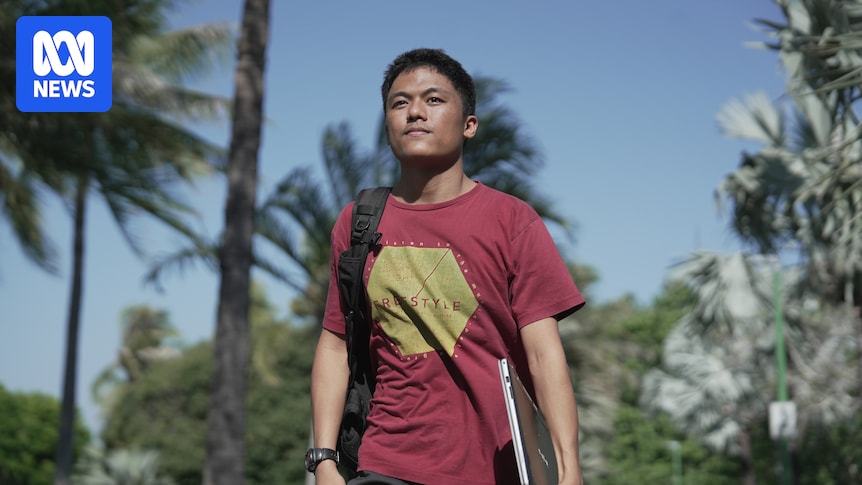A Darwin teenager has been selected as one of just four Australian youth delegates to take part in climate talks at a major upcoming United Nations conference in Baku, Azerbaijan.
Peter Susanto, 17, is the first person from the Northern Territory to be selected for the Emerging Climate Leaders Program, which sends delegates to the annual UN Climate Change Conference, or Conference of the Parties (COP).
Now in its 29th year, the conference is attended by thousands of government officials, climate organisations, businesses and academics from around the world to discuss pathways forward in tackling climate change.
Peter Susanto is the first ever youth delegate from the Northern Territory to attend the conference. (ABC News: Dane Hirst)
“It’s a really big honour for me, especially as the first ever from the Northern Territory,” Peter said.
“It fills me with a sense of responsibility and pride in doing my best so we can be represented on that global stage.”
Peter has dedicated the past two years to studying a Bachelor of Clinical Science at Charles Darwin University, having started when he was just 15, and intends to pursue a career in medicine.
He is also the current NT Young Australian of the Year.
Peter said medicine and climate change should be considered hand-in-hand.
Peter Susanto is studying to become a doctor at Charles Darwin University. (ABC News: Dane Hirst)
“Rising temperatures result in further spread of infectious diseases, natural disasters and extreme weather events cause significant loss of life … and the financial impacts of climate change will also impact health systems,” he said.
“The entire health system can take an active role in fighting against climate change and promoting sustainability, rather than a reactive role.”
From Darwin to the global stage
Peter will join three other young Australians at COP29, where he’ll have access to the “blue zone”, a space for formal negotiations between governments.
Prominent Australian environmentalist, author and Climate Council councillor, Tim Flannery, emphasised the importance of attending and engaging with the UN’s climate change conferences.
Tim Flannery says it’s important for world leaders to hear young people’s concerns. (ABC Illawarra: Tim Fernandez)
“The COP meetings might seem a bit abstract to some people, but the reality is they’re the largest meetings outside the Olympics that we have in the world,” he said.
“The COPs are where the world makes up its mind about what we’re going to do about climate change, and climate change is a vital issue for everyone.”
Professor Flannery said young people’s attendance at the COP meetings was vital and youth delegates would be genuinely listened to.
“A lot of these meetings can be rather grey, and they can be very male,” he said.
“So to mix that up a bit and hear from women, younger people, people from developing countries, Indigenous groups, it is hugely important, because we’re all being impacted.”
Young people also advocated for their concerns around climate change at last year’s COP28. (AP/Peter Dejong)
Peter said he felt strongly about the responsibility of appearing at the conference, especially as the first and only youth representative from the NT.
“In the NT we have a lot of natural resources and a lot of potential for renewable energy, and that’s something I’m really excited to be talking about and bringing those eyes onto,” he said.
NT’s climate record a ‘concern’
The Northern Territory has in recent years drawn criticism over several controversial environmental decisions.
There have been regular protests over plans to forge ahead with fracking in the Beetaloo Basin after the NT’s former Labor government approved a full-scale fracking industry last year.
And there have been calls for a royal commission into water management in the NT after an ABC Four Corners investigation uncovered large new water licences were being handed out to developers.
A group of anti-fracking protesters fronted a recent resources conference in Darwin. (Supplied: Elliot Hughes)
Professor Flannery said climate decisions in the Northern Territory were contributing to Australia’s less-than-perfect reputation on a global stage.
“They see a nation that is really dragging its feet in terms of meeting the global climate targets in the Paris Agreement that we’ve all signed up to,” he said.
“There’s a fair bit of cynicism out there when Australia’s speaking out on one side of its mouth saying ‘we’re going to do all this [for climate change]’, and then on the other side saying ‘but we’re going to have our fossil fuels as well’.
“That is just not possible, and the world knows that.”
But Peter is determined to drive change, and is eager to bring back the lessons he’ll learn from his time in Azerbaijan.
“I hope to bring back the knowledge I learn, to form networks, connections and maybe even partnerships for people in the Northern Territory to collaborate with other people around the world,” he said.
